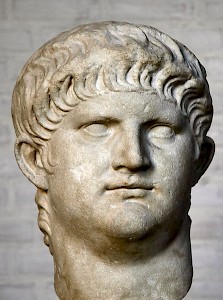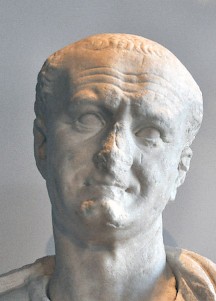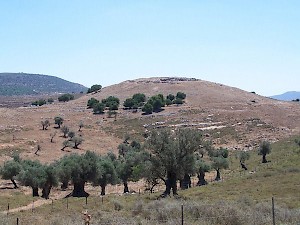Jewish War (66-70)
Roman-Jewish Wars: name of several military engagements between the Roman Republic (later: Empire) and various groups of Jews between 63 BCE and 136 CE.
Causes of the War of 66-70

In 66, the Roman emperor Nero needed money, and ordered his representative in Judaea, Gessius Florus, to confiscate it from the Temple treasure. The governor was not amused when some Jewish jokers passed the hat round for "that poor procurator Florus".note He demanded their punishment, but when his policemen could not find the mockers, he had some passersby arrested and crucified.
Of course this was tactless and brutal, but it it would not have led to the destruction of Jerusalem and the Temple if there had not been one or two deeper causes. The obvious reason why this incident led to war, was the religious tension between the Jewish populace and the Roman government. However, the Roman governors and the Temple authorities had found practical solutions to deal with these problems.
The deepest cause of the war was the impoverishment of the Jewish peasantry. Sixty years of Roman taxation had meant only one thing: the Jews had to pay money, which was spent in Italy and on the border. Judaea had become substantially poorer and many peasants had been forced first to mortgage and then to sell their land. Besides, in Jerusalem many people had become unemployed when he renovation of the temple was finished in 63. The peasants and artsians had a reason to fight, and they were willing to do so.
There may have been a portent that gave them hope. There was a prophecy in the book of Numbers (24.17) that "a star shall come forth out of Jacob, a scepter shall rise out of Israel", which was commonly taken to be a prediction of the Messiah. At the end of 64, there had been a comet,note which must have made a discontent populace even more discontent.
For some time, the Temple authorities had been able to check the peasant's anger. But in the third quarter of the first century, most people considered the high priesthood corrupt. The war of 66-70 was not only a war between the Romans and Jews, it was also a class struggle.
The year 66: escalation
The incident with the collection plate set fire to the powder. Even though the high priest Ananias and the Jewish prince Marcus Julius Agrippa tried to pour oil on the troubled waters, they were no longer in control of the situation. Many moderates were maltreated; while envoys were on their way to Nero, one of the Roman garrisons in Jerusalem was annihilated. War had become inevitable.
In August 66, a man named Menahem made a raid on the fortress of Masada, where he seized lots of weapons. This Menahem was the son or the grandson of Judas the Galilean, who had led an anti-Roman revolt in 6 CE; two of his relatives had been crucified after a similar disturbance. The group of Menahem was called Sicarians ("dagger men"). They hailed their leader as king of the Jews and went to Jerusalem, where they laid siege to the remaining Roman garrison. The new king had the high priest Ananias executed, but when he went to the Temple, he was lynched by the adherents of Ananias' son. The Sicarians left Jerusalem and returned to Masada, which they used as a base for a guerilla war, until they were defeated in 74 (below).
In September 66, the Romans in Jerusalem surrendered and were lynched. Meanwhile, the Greek inhabitants of the capital of Judaea, Caesarea, attacked their Jewish neighbors; the Jews replied in kind, expelling many Greeks from Judaea, Galilee and the Golan heights.
When Gessius Florus was replaced (by Antonius Julianus), the governor of Syria, Gaius Cestius Gallus, tried to pacify the rebellious province and led a legion - the Twelfth, surnamed Fulminata - to Jerusalem. It was reinforced with units of III Gallica, IIII Scythica, and VI Ferrata, plus auxiliaries and foreign allies. It liberated the pro-Roman capital of Galilee, Sepphoris, and continued to Jerusalem.
In November, however, the army was forced to return; on his way back, he was defeated by one of the leaders of the Zealots, Eleazar son of Simon. Humiliation was added to the disgrace: the legion lost its standard. This may have been a Jewish success, but it was clear that the Romans would return with a larger army, and many people left Jerusalem, leaving it in the hands of the radicals. There is a late tradition that says that among those who went away, were the Jewish Christians.
Moderate rabbis like Yohanan ben Zakkai may still have counseled peace, making a distinction between obligatory and optional war, but they were a minority. Most Jews prepared for a big war.
The year 67: outbreak of the war

The Temple authorities elected generals and ordered them to take charge of the countryside. (One of these was Joseph son of Matthias, the future historian Flavius Josephus.) One of their aims was to seize the ports, which would make it difficult for the Romans to land their forces. At the same time, Nero appointed a new commander: Titus Flavius Vespasianus, also known as Vespasian. This old war horse, who had commanded legions in Germania and Britain, had recently been pensioned off after falling asleep during one of Nero's musical performances; his recall proves that the situation had become very critical indeed. Vespasian appointed his son Titus as one of his lieutenants; his younger son Domitian was kept in honorable detention at the imperial court - to make sure that his father would not rebel.
While both sides were preparing for a great war, peasant leaders arose in Judaea. Some of them tried to keep their community out of the war, others organized militias to attack all non-Jews. One of the latter was John of Gischala, who controlled the Galilean countryside, which was the province assigned to Joseph son of Matthias. Soon, the two generals were at each others throats, which prevented the Jews from seizing Sepphoris, the pro-Roman capital of Galilee.
Vespasian's first action was to reinforce Sepphoris (Spring 67). Immediately after the rainy season, he proceeded to the port of Ptolemais (modern Acre), where he gathered his troops. The Tenth Legion, surnamed Fretensis, he had taken over from the Syrian governor Cestius, who had committed suicide; the Fifth Legion, called Macedonica, had been under his own command for some time. His son Titus brought the Fifteenth Legion, Apollinaris. In addition to this army, there were numerous cavalry units and auxiliary troops.

Vespasian now expelled John of Gischala from a town named Gadara, and after this first success, he marched on Jotapata, which was defended by Joseph son of Matthias. After a bitter struggle, the Romans took the city; its commander was taken prisoner and saved his life by applying the messianic prophecy to Vespasian and predicting him imperial rule (1 July; go here and here for the full story).
The road to Sepphoris being now secured, Vespasian proceeded along the coast to liberate the ports. Meanwhile, John of Gischala continued the struggle in the Golan heights, on Mount Tabor and from his hometown Gischala. It took Vespasian's son Titus and other commanders a lot of time and energy to pacify Galilee. However, in January 68, they had succeeded.
In November 67, John had abandoned his guerilla war and gone to Jerusalem, where he became an important leader, behaving himself as a king. There were two other parties in the city: the Sadducee Temple authorities and the Zealots of Eleazar son of Simon. The latter were the most influential: they occupied the Temple, removed the high priest from the scene and replaced him by a strawman named Phannias. Frequently, these two parties used violence in their quarrels, and many Jews left the city.
They told the Roman generals about the civil strife; and Vespasian decided to postpone his attack until the defenders had worn themselves down. He used the spring of 68 to gain control of the Jordan valley and the fertile region called Peraea ("the other side", that is, of the Jordan river). Meanwhile, his soldiers seized the crops of the Jewish peasantry. During this campaign, the settlement at Qumran (where the Scrolls of the Dead Sea were found) was destroyed by soldiers of X Fretensis.
Having achieved control of Galilee, the coastal region and the Jordan valley, Vespasian could have attacked Jerusalem from three sides. At that moment, however, a messenger brought remarkable news came from Italy: Nero had committed suicide and a senator named Galba was the new ruler of the Roman Empire. Vespasian immediately sent his son Titus to Rome to congratulate the new emperor, but before he had reached Greece, he learned that Galba had been lynched by his own guard. Two new pretenders, Vitellius and Otho, were engaged in a civil war.
Titus returned to Judaea, where his father decided to postpone the war against the Jews and to intervene in the civil war. Vespasian and Titus were clever diplomats, who secured the support of several Syrian princes, the governor of Egypt and the legions along the Danube. In July 69, on hearing the news that Vitellius had defeated Otho, Vespasian had himself proclaimed emperor, claiming that he wanted to avenge Galba. He went to Egypt, where he cut off the Italian food supply. In September, the army of the Danube defeated the troops of Vitellius. In December, Vespasian was the sole ruler of the world empire. The man who had predicted it, Joseph son of Matthias, was released and received Roman citizenship and a new name Flavius Josephus.
To the Jews, the situation did not seem hopeless. The appearance of a new cometnote seemed to indicate that the time for the great war of liberation had come? And indeed. The Romans had paused their attacks for some time, there was a civil war, and at the other end of the empire, the Batavians had revolted, and a new emperor, Julius Sabinus, had been proclaimed in Gaul. Some optimism was permitted.
However, the Romans would come to restore order very soon.